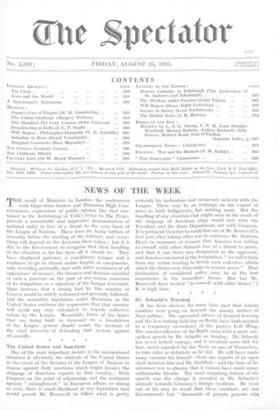The United States and Sanctions One of the most important
factors in the international situation is obviously the attitude of the United States in the event of the decision of the League of Nations to impose against Italy sanctions which might involve the stoppage of American exports to that country. With Congress on the point of adjourning, and the sentiment against " entanglement " in European affairs as strong as ever, there is small. likelihood of any legislation that would permit Mr. Roosevelt to follow what is pretty certainly his inclination and co-operate actively with the League. There may be an embargo on the export of arms to both belligerents, but nothing more. But the handling of any situation that might arise as the result of the stoppage of American ships would rest with the President and the State Department, not with Congress. It is pertinent therefore to recall that one of Mr. Roosevelt's first acts after taking office was to authorise Mr. Norman, Davis to announce at Geneva that America was willing to consult With other States in face of a threat to peace, and that if one State was designated as the aggressor, and America concurred in the designation, " we will refrain from any action tending to defeat such collective efforts which the States may thus make to restore peace." That declaration of considered policy may be of the first importance in the immediate future. But has Mr. Roosevelt been invited " to consult with other States " ? It is high time.


































